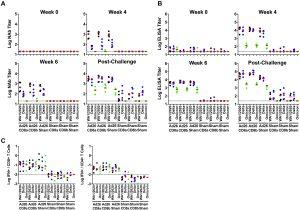It is known that COVID-19 vaccines have become less effective due to the rise of new variants of concern (VOCs) which can evade the immune response as well as vaccine induced immunity. Therefore, there is a strong need to continuously improve on existing vaccines. Previous studies have highlighted CD8+ T-cell responses and how they are associated with natural immune protection against SARS-CoV-2.
In a recent paper, researchers described the effects and role of CD8+ T-cell responses following vaccination with Ad26.COV2.S (Janssen/Johnson & Johnson) in the response against SARS-CoV-2 infection utilising a rhesus macaques model (Figure 1).

Figure 1: Immune responses following vaccination. Antibody responses at weeks 0, 4, and 6 following vaccination with Ad26.COV2.S and following challenge. A, Neutralizing antibody (NAb) titers by a luciferase-based pseudovirus neutralization assay. B, Receptor binding domain (RBD)-specific binding antibody titers by ELISA. C, Pooled peptide Spike-specific IFN-γ CD8+ and CD4+ T cell responses by intracellular cytokine staining assays at week 2 following vaccination with Ad26.COV2.S. Responses were measured against the SARS-CoV-2 WA1/2020 (black), B.1.617.2 (Delta; blue), and B.1.1.529 (Omicron; green) variants. Dotted lines represent limits of quantitation. Medians (red bars) are shown.
They were also able to suggest that CD8+ T-cell responses may control the viral load after mRNA vaccination which would need further validation. A significant finding was that the CD8+ T-cell responses were able to efficiently inhibit the SARS-CoV-2 VOCs such as the Delta and Omicron variants, which have been described as effective evaders of the neutralising antibody response.
Future research should look at the T-cell response, in addition to antibody response to truly establish how effective vaccines are as a whole in inducing immunity to SARS-CoV-2.
In their own words:
“In conclusion, we show that CD8+ T cell responses contribute substantially to Ad26.COV2.S vaccine protection against SARS-CoV-2 replication in rhesus macaques. We speculate that CD8+ T cell responses may also contribute to virologic control following mRNA vaccination, although this has not yet been demonstrated. Both humoral and cellular immune responses are likely important for vaccine protection against SARS-CoV-2 severe disease.”
Journal article: Liu, J., et al., 2022. CD8 T Cells Contribute to Vaccine Protection Against SARS-CoV-2 in Macaques. Science Immunology.
Summary by Stefan Botha










